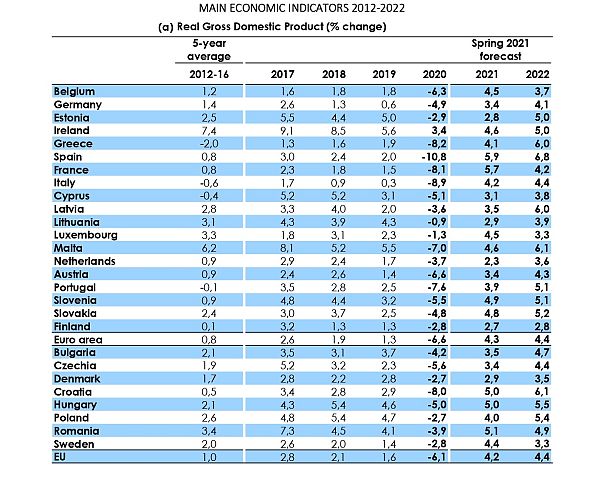The European Commission estimates that this year the EU and the eurozone will grow by 4.2% and 4.3%, respectively.
The European Union's economy is set to grow faster than expected in 2021 and 2022 thanks to the accelerating pace of vaccination across the bloc and the gradual ease of coronavirus restrictions.
 ADVERTISEMENT
ADVERTISEMENT
 ADVERTISEMENT
ADVERTISEMENT
As of today, EU countries have administered 175.3 million vaccine doses and almost 30% of the population have received at least one dose.
These conditions have encouraged the European Commission to upgrade its economic forecast: the executive now estimates that this year the EU's economy will grow by 4.2% while the eurozone will expand by 4.3 percent.
The numbers represent an improvement from the respective 3.7% and 3.8% growth rates predicted back in February, when the inoculation campaign was mostly stalled.
The brighter outlook is also based on the anticipated impact of Next Generation EU, the bloc's €750-billion recovery fund. The fund is not yet operational but money is expected to be disbursed as early as July. For the time being, the Commission is only taking into account the effects of grants, which make up €312.5 billion of the total fund.
For 2022, the Commission predict similar volumes: 4.4% growth for both the EU and the eurozone, which comprises 19 of the bloc's 27 member states.
"The shadow of COVID-19 is beginning to lift from Europe's economy," said European Commissioner Paolo Gentiloni, who explained the growth will be driven by private consumption, investment and a rising demand for EU exports from a stronger global economy.
"Maintaining the now strong pace of vaccinations in the EU will be crucial – for the health of our citizens as well as our economies. So let's all roll up our sleeves.”
All EU countries will return to pre-crisis level by the end of 2022, although some will recover with greater speed than others. Poland, Sweden, Denmark, Hungary, Romania, Slovakia, Lithuania and Luxembourg will offset all the pandemic losses already this year, with Estonia and Finland coming close to achieving the coveted goal.
The remaining EU countries, including Germany, France, Italy and Spain, will have to wait until 2022 to see a full recovery. Despite the long road ahead, the estimation is also good news: in its previous forecast, the Commission expected Spain, Greece and Italy to completely recover sometime in 2023.
The updated economic forecast confirms that Spain was the only country that registered a two-digit plunge in 2020, with a 10.8% drop. On the opposite side, Ireland was the only member state that saw growth in 2020 (3.4%) and is poised to continue expanding steadily in 2021 (4.6%) and 2022 (5%).
Rising debt and unemployment
Since the coronavirus arrived in the continent, European economies have been injecting enormous amounts of fiscal support to prevent companies from going bankrupt and workers from becoming unemployed.
As a result, the debt-to-GDP ratio inside the eurozone will rise to 102% in 2021, the highest level ever recorded, to then slightly fall back to 101% in 2022. The EU as a whole will see a ratio of 94% and 93%, respectively.
The Commission believes the EU's unemployment rate will be higher in 2021 (7.6%) than it was in 2020 (7.1%) and will then recede in 2022 (7%).
"Today, for the first time since the pandemic hit, we see some optimism prevailing over uncertainty. But uncertainty is, of course, still there," Gentiloni said.
The risks will remain high as long as COVID-19 looms over Europe, the Commissioner noted. There are still many unanswered questions about the long-term effectiveness of vaccines and consumers' desire to spend their accumulated savings might be overestimated (or even underestimated).
National governments must be careful to withdraw their fiscal support measures at the right time, the executive warned. If they do so too early, the recovery could be jeopardised. But if they do so too late, the market could be distorted.
The new forecast from the Commission is in line with the 4.4% growth rate that the International Monetary Fund predicts for the eurozone this year, an estimation which also represents an upward revision.
"The big question is the uncertainty and the range of variation in some of the countries that are better off and the ones that are not. Some countries, even in winter, were not expected to recover until 2023 and that level of waiting and uncertainty is still problematic," Rebecca Christie, an economist at the Bruegel think tank, told Euronews.
"People are expected more manufacturing and they are expecting more consumer spending in countries with a lot of savings, like Germany. The struggles are going to be in the services sector and regions that have been very hard hit that won't have the same level of bustle that you get with a true economic recovery."











